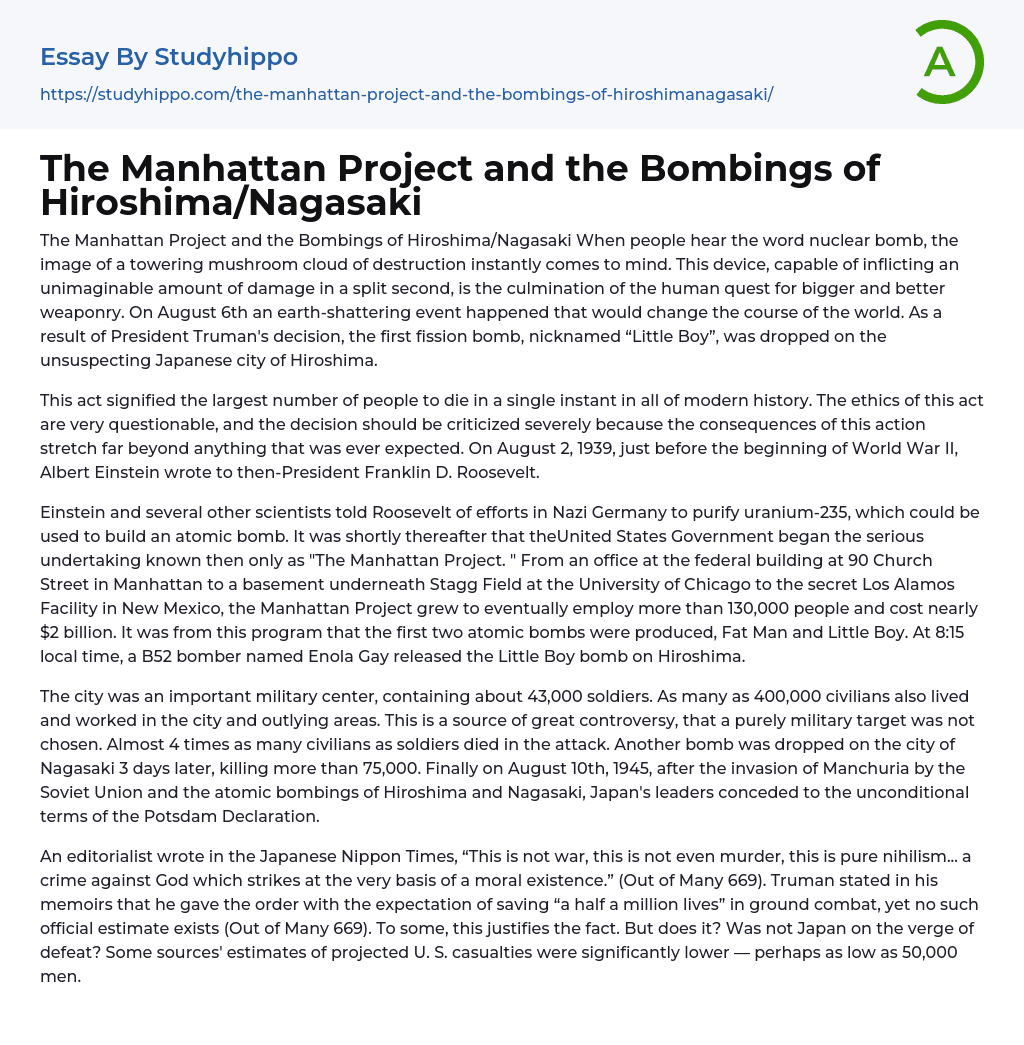

The Manhattan Project and the Bombings of Hiroshima/Nagasaki Essay Example
The Manhattan Project and the Bombings of Hiroshima/Nagasaki When people hear the word nuclear bomb, the image of a towering mushroom cloud of destruction instantly comes to mind. This device, capable of inflicting an unimaginable amount of damage in a split second, is the culmination of the human quest for bigger and better weaponry. On August 6th an earth-shattering event happened that would change the course of the world. As a result of President Truman's decision, the first fission bomb, nicknamed “Little Boy”, was dropped on the unsuspecting Japanese city of Hiroshima.
This act signified the largest number of people to die in a single instant in all of modern history. The ethics of this act are very questionable, and the decision should be criticized severely because the consequences of this action stretch far beyond anyth
...ing that was ever expected. On August 2, 1939, just before the beginning of World War II, Albert Einstein wrote to then-President Franklin D. Roosevelt.
Einstein and several other scientists told Roosevelt of efforts in Nazi Germany to purify uranium-235, which could be used to build an atomic bomb. It was shortly thereafter that theUnited States Government began the serious undertaking known then only as "The Manhattan Project. " From an office at the federal building at 90 Church Street in Manhattan to a basement underneath Stagg Field at the University of Chicago to the secret Los Alamos Facility in New Mexico, the Manhattan Project grew to eventually employ more than 130,000 people and cost nearly $2 billion. It was from this program that the first two atomic bombs were produced, Fat Man and Little Boy. At 8:15 local time, a B5
bomber named Enola Gay released the Little Boy bomb on Hiroshima.
The city was an important military center, containing about 43,000 soldiers. As many as 400,000 civilians also lived and worked in the city and outlying areas. This is a source of great controversy, that a purely military target was not chosen. Almost 4 times as many civilians as soldiers died in the attack. Another bomb was dropped on the city of Nagasaki 3 days later, killing more than 75,000. Finally on August 10th, 1945, after the invasion of Manchuria by the Soviet Union and the atomic bombings of Hiroshima and Nagasaki, Japan's leaders conceded to the unconditional terms of the Potsdam Declaration.
An editorialist wrote in the Japanese Nippon Times, “This is not war, this is not even murder, this is pure nihilism... a crime against God which strikes at the very basis of a moral existence.” (Out of Many 669). Truman stated in his memoirs that he gave the order with the expectation of saving “a half a million lives” in ground combat, yet no such official estimate exists (Out of Many 669). To some, this justifies the fact. But does it? Was not Japan on the verge of defeat? Some sources' estimates of projected U. S. casualties were significantly lower — perhaps as low as 50,000 men.
It is also not entirely clear that unconditional Japanese surrender was impossible, especially if Russia had entered the war before the bombing there were other motivating reasons for the use of the nuclear bomb. “Russia might be more manageable if impressed by American military might, and that a demonstration of the bomb might impress Russia." (Spencer Weart and
Gertrud Szilard, Leo Szilard: His version of the facts, pg. 184). The decision to drop the bomb on Japan leans dangerously close towards the logic of the end justifying the means.
This slippery slope could spell disaster when dealing with weapons of such power and magnitude. The atomic bomb has changed world politics forever. We live under the menacing shadow of missiles that could obliterate the earth 10 times over. It's impossible to say what would have happened had Truman not decided to use nuclear weapons.
All we can hope for is the fact that they will never again be used on earth.
- Atomic Bombings Of Hiroshima And Nagasaki essays
- Atomic Physics essays
- Cuban Missile Crisis essays
- Fidel Castro essays
- French Revolution essays
- Han Dynasty essays
- Hiroshima essays
- Imperialism essays
- Jack The Ripper essays
- Mao Zedong essays
- Middle Ages essays
- Mongols essays
- Nelson Mandela essays
- Ottoman Empire essays
- Reformation essays
- Reign of Terror essays
- Renaissance essays
- Roaring Twenties essays
- Romanticism essays
- Samurai essays
- Scientific Revolution essays
- Soviet Union essays
- American Civil War essays
- Atomic Bomb essays
- Attack essays
- Cold War essays
- Crimean War essays
- Diplomacy essays
- Emilio Aguinaldo essays
- Emperor essays
- Hitler essays
- Iraq War essays
- Korean War essays
- Mexican American War essays
- Nazism essays
- Nuclear Weapon essays
- Philippine Revolution essays
- Revolutionary War essays
- Rwanda essays
- The Spanish American War essays
- Trench Warfare essays
- Tribe essays
- Vietnam War essays
- War of 1812 essays
- Western Front essays
- World War I essays
- World War Ii essays
- Coaching essays
- Critical Thinking essays
- homework essays



